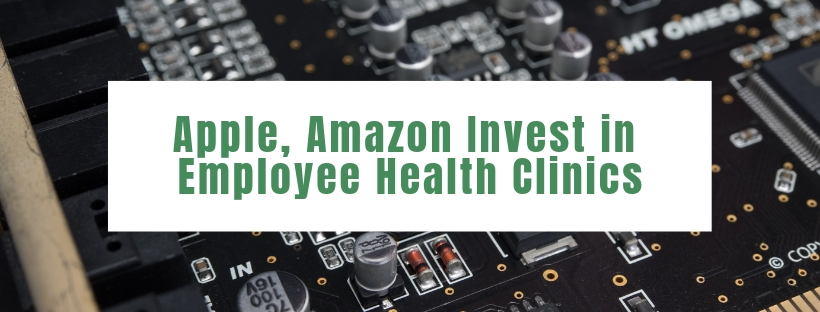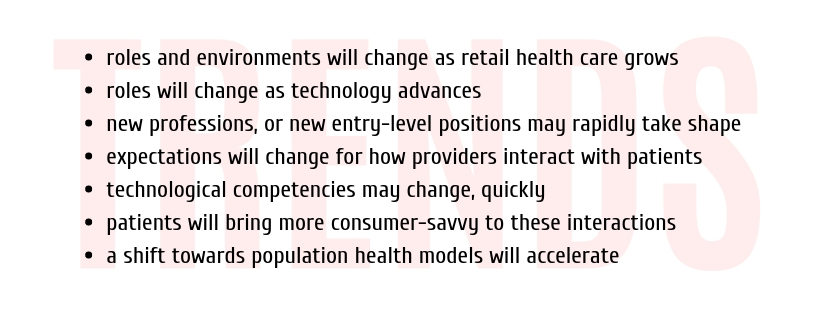The new year brings with it reflection and speculation. We've rounded up some recent articles and highlights from 2018 to summarize the biggest trends affecting health professions in 2019.
Tech companies horn in on health care
In previous blogs, we've detailed Amazon's recent developments in artificial intelligence with applications in health care, here and here. Experts expect artificial intelligence to become "an every day affair" in 2019. Amazon's ready-for-market AI which can accurately analyze patient records is just one example of what's soon to be widely available and in use. But artificial intelligence is far from the only way tech companies will be affecting health professions in 2019.
Major tech companies are targeting health care as a huge, untapped market for potential innovations. A recent report suggested that Apple has hired "dozens of MDs," scattered across a number of teams to guide strategy. Apple can be expected to continue developing medical applications for its phone and wearable technology, though the EKG feature of the latest Apple Watch has been heavily criticized. Apple has also made acquisitions in personal health data applications, and is likely to be developing many different products that aid the interchange of patient data between health providers and consumers (read: everyone).

Amazon, Apple invest in employee health clinics
What's particularly telling, however, is that both Amazon and Apple are investing in health clinics for their employees. These clinics would be a significant development if their intent were only to control costs for the employers at their huge corporate campuses. In that capacity, both are exciting, large-scale initiatives in population health, initiatives that could become blueprints for reform.
But experts suggest the clinics will also be testing grounds for health care products developed by the two companies. These clinics will allow them to experiment without risking leaks, a priority for tech companies that are "notoriously obsessed with secrecy."
A nerdy aside: Jeff Bezos's Blue Origin was testing relative puddle-jumpers in rocket terms before recently dropping a payload user guide for one of the largest rockets ever designed, and quickly winning a major contract. It goes to show how these tech giants can make tremendous strides behind a curtain.
To some degree, we're expecting more trends affecting health professions in 2019 to come out of these two companies, we just don't know what they are yet. With regards to the buzzwords in the health IT space, like "interoperability" and "blockchain" patient data, we can expect these major players to make moves.
Ultimately, we're talking about large laboratories of innovation in health care from two huge innovators. These laboratories will have an impact not just on the technology but the fundamental models of health care delivery. How will your profession be involved?

Mergers highlight trends affecting health professions
In terms of innovations coming from within the industry, the major pharmacies seem to be leading the way. With their massive retail footprints and regular pharmacy contacts with the patient population, pharmacies could rapidly be accepted as primary care providers and transform health care delivery models.
We've previously discussed how the CVS-Aetna merger could drastically change health care. The latest news is that Judge Richard Leon essentially accepted CVS Health's proposed conditions. The merger will go ahead, while some functions are to remain separate. CVS-Aetna, combined, will continue to be monitored.
While there may be legitimate concerns about the potential vertical monopoly power CVS-Aetna might wield, the crisis of rising health care costs might help keep this combination in the public interest. We can expect major synergies in pharmacy to drive down costs for consumers. We can also expect CVS Health to expand investment in re-tooling its retail stores into primary-care clinics to better serve Aetna consumers.
More primary care collaborations to come
Don't count out the competition, either. Walgreens entered into a primary care joint venture with Humana for the medicare population earlier in 2018. Recent reports from Forbes suggest that six months of operation had promising results. "I believe it has a good chance that this may provide a template for primary care in many of our stores," said Walgreens co-chief operating officer Alex Gourlay in the company's earnings call.
These results are surely forming the basis of preliminary talks, reported in November, that Humana and Walgreens may take stakes in each other or ultimately merge. While there's no guarantee of a deal, the CVS-Aetna merger going through presses the issue. The trend is clear. In October, Walgreens CEO Stefano Pessina told Bloomberg News, "We should have bought an insurance company four years ago."
To speculate on the future of health care, we're following the money. In 2019, we're poised to see a great deal more investment in new primary care models from these corporations. If effective at reducing costs, these models could quickly be adopted widely and shift a large percentage of health care delivery. The convenience of Walgreens and CVS Health's retail footprint is a major selling point for consumers.

Break down: trends affecting health professions in 2019
We've only looked at two major trends affecting health professions in 2019. A confluence of pressures and new synergies will lead to expanding investment in health care service delivery in retail environments. Also, while we can't be sure what new technologies and models might suddenly hit the market, we can expect big things from Amazon and Apple.
Both trends offer many more takeaways for how health professions might change in the near future:
- roles and environments will change as retail health care grows
- roles will change as technology advances
- new professions, or new entry-level positions may rapidly take shape
- expectations will change for how providers interact with patients
- technological competencies may change, quickly
- patients will bring more consumer-savvy to these interactions
- a shift towards population health models will accelerate
In fact, a lot of these takeaways remind me of our State of the Industry report, a white paper which summarized the many factors and avenues of potential change in this dynamic marketplace. This report resulted from discussions at a recent Health Professions Network summit.
But ultimately, in attempting to predict what might affect health professions most, and most quickly, we've got to follow the money. In 2019, we're not just talking about over-hyped technologies, we're talking about real, significant investment, by major industry players, in models and technology that could fundamentally change how health care gets delivered in the United States.
One big idea: industry impact on health care and health professions
The trends affecting health professions in 2019 aren't coming from legislators, regulators or even providers. They're coming from cold, hard investments by industry—big players that see opportunity in circumventing business-as-usual. The opportunity to cut costs of employee health insurance, or to tap into and profit from a huge and growing consumer marketplace.
That's why industry impact focuses our Spring conference in Cincinnati. Industry impact on health care will be significant, and change will happen fast. HPN seeks to stay ahead of the curve on behalf of our members and our members' members.
Join the Health Professions Network at our April 3-5 conference to make in-roads on these industry developments, and learn how these massive trends may affect your profession—in the immediate future. We can guarantee you’ll leave with practical takeaways to guide your organization’s strategy and make a greater impact for the professionals you support.
Register, today for our spring conference »
Don’t forget, as a Health Professions Network member, you’ll receive an immediate discount on registration fees for our Spring conference. Learn more about how membership in the Health Professions Network can benefit you and your organization, here.
Membership in the Health Professions Network will not only keep you on top of trends affecting health professions, like industry impact on health care. Membership will also connect you to a supportive, caring network of professionals involved in associations, accrediting agencies, certification bodies, educational institutions, workforce analysis, and more—all focused on supporting allied health professionals. Joining HPN will also ensure that your profession’s voice is represented in the important care discussions to come.
Join the Health Professions Network, now »
The Health Professions Network (HPN) is a nationwide collaborative group of organizations representing leading health professions associations, accrediting agencies, and educational institutions, as well as federal and state workforce analysts and licensing and certification bodies.
